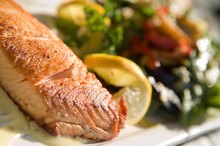Why Do People Who Have Had Gastric Bypass Avoid Sugar?
In 2004, 94 percent of the 121,055 weight loss surgery procedures performed in the United States were gastric bypasses, according to a January 2007 report published by the Agency for Healthcare Research and Quality 4. Most patients lose 80 percent of the excess weight within the first year after surgery, according to Sinai Hospital 1. Patients must make long-term dietary adjustments, including avoiding sugar, to keep the weight off and avoid unpleasant digestive symptoms.
Gastric Bypass
Considered the gold standard for weight loss surgery, gastric bypass procedures help morbidly obese patients lose weight by restricting the size of the stomach and bypassing part of the small intestine to block some calorie absorption. The patient feels full after eating a small amount of food and does not absorb some of the calories in the meal, so she loses weight rapidly during the first year.
Sugar
Fruit Juices After Gastric Bypass
Learn More
Carbohydrates fuel the body by converting into glucose. Complex carbohydrates, found in grains, vegetables and cereals, contain fiber and other nutrients. Simple carbohydrates or sugars contain few nutrients. Found naturally in fruits, vegetables and milk, sugars are also added to many processed foods. Added sugars include:
- brown sugar
- corn sweetener
- corn syrup
- dextrose
- fructose
- fruit juice concentrates
- glucose
- high-fructose corn syrup
- honey
- lactose
- maltose
- malt syrup
- molasses
- raw sugar or sucrose
- according to the Centers for Disease Control
- Prevention
Gastric bypass patients should read food labels carefully to avoid sugar-related issues.
- Carbohydrates fuel the body by converting into glucose.
- Complex carbohydrates, found in grains, vegetables and cereals, contain fiber and other nutrients.
Dumping Syndrome
Dumping syndrome, a condition that causes mild to severe diarrhea, nausea, bloating and abdominal cramping, occurs in at east 15 to 20 percent of gastric bypass patients after eating sugary or fatty food, according to the University of Rochester Medical Center website 3.cause:
- Dumping syndrome
- a condition that causes mild to severe diarrhea
- nausea
- bloating
- abdominal cramping
- occurs in at east 15 to 20 percent of gastric bypass patients after eating sugary or fatty food
- according to the University of Rochester Medical Center website 3
The food moves too quickly through the stomach and dumps into the small intestine, requiring the bowels to take over the digestion process. Symptoms eventually subside without medical intervention, but weight loss surgeons instruct their patients to avoid sugary foods, including fruit juice, to prevent episodes of dumping syndrome 3.
High-Protein, Low-Sugar Diet
Gastric Bypass, Diarrhea and Smelly Gas
Learn More
Weight loss surgeons instruct their patients to eat a low-sugar, low-fat, high-protein diet for the rest of their lives to promote health and weight loss. Patients must plan their meals around protein -- at least 60 to 80 g per day -- to prevent loss of hair and lean muscle, according to Linda Aills, R.D., lead researcher in a study published in the September 2008 issue of "Surgery for Obesity and Related Diseases." Since the stomach is reduced to an egg-sized pouch after gastric bypass, filling it with sugary food would prevent the patient from eating the protein necessary to prevent loss of hair and lean muscle mass.
Calorie Restrictions
Sugary foods contain high amounts of calories, raising the total number of calories consumed during the day. While bariatric surgeons generally refer to portion sizes and healthy food choices rather than calorie counting after gastric bypass, weight loss will slow if the patient consumes more calories than needed. After the first year, patients must work to maintain weight loss through exercise and diet, so choosing high-calorie foods may cause the patient to regain some or all of the weight that was lost.
- Sugary foods contain high amounts of calories, raising the total number of calories consumed during the day.
- While bariatric surgeons generally refer to portion sizes and healthy food choices rather than calorie counting after gastric bypass, weight loss will slow if the patient consumes more calories than needed.
Related Articles
References
- Sinai Hospital: Problems Following GBP Surgery
- Sinai Hospital: General Instructions to Gastric Bypass
- University of Rochester Medical Center: Dumping Syndrome
- Agency for Healthcare Research and Quality: Healthcare Cost and Utilization Project Statistical Brief, January 2007
- Berg P, McCallum R. Dumping Syndrome: A Review of the Current Concepts of Pathophysiology, Diagnosis, and Treatment. Dig Dis Sci. 2016;61(1):11-18. doi:10.1007/s10620-015-3839-x
- Ma IT, Madura JA 2nd. Gastrointestinal Complications After Bariatric Surgery. Gastroenterol Hepatol (N Y). 2015;11(8):526-535.
- National Institute of Diabetes and Digestive and Kidney Diseases. Symptoms & Causes of Dumping Syndrome. Updated January 2019.
- Cleveland Clinic. Dumping Syndrome: Prevention. Updated April 24, 2018.
- University of Rochester Medical Center. Health Encyclopedia. Dumping syndrome after gastric bypass surgery. Updated 2020.
Writer Bio
Marcy Brinkley has been writing professionally since 2007. Her work has appeared in "Chicken Soup for the Soul," "Texas Health Law Reporter" and the "State Bar of Texas Health Law Section Report." Her degrees include a Bachelor of Science in Nursing; a Master of Business Administration; and a Doctor of Jurisprudence.









